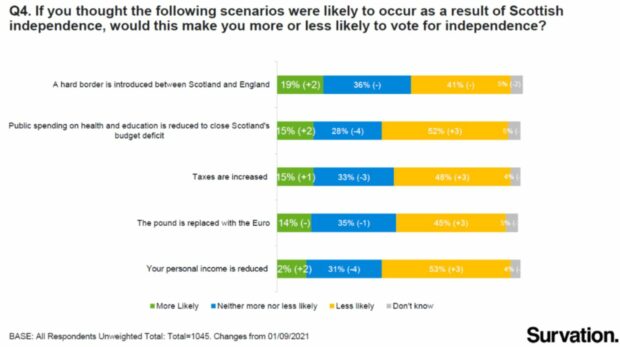Yes, no, leave, remain — simple enough answers for complicated questions on the future of the country.
A recent snapshot of public opinion suggested most Scots would support independence if asked now.
But beyond the headline figure showing 55% support for a Yes vote there are signs the pro-independence campaign still has work to do.
When it comes to the details of crucial policies on currency, the border with England, the future of public spending and tax – even the way the question is posed – pro-union groups think they have an edge.
An exclusive look at new research by polling company Survation reveals the key issues which can push swing voters one way or another.
1. Would there be a ‘hard border’?
The debate on borders became more tangible with Brexit.
Scotland voted overwhelmingly to remain in the EU, which promotes an open border policy inside the bloc.
Leaving the EU as part of the UK showcased how difficult a hard border between non-member and member states can be, in particular Northern Ireland.
Now, businesses selling to the EU from Britain need to take part in regulation and border checks when goods are transported — something which wasn’t required as a member of the single market.
The poll findings show more people are less likely to vote for independence if the border is hardened with England.
Survation found 41% would be less likely to back independence in those circumstances, compared with 19% being ‘more likely’ and 36% who were not swayed either way.
The Institute For Government note the Northern Ireland protocol preventing a hard border on the island of Ireland is an exception, not a rule.
If Scotland rejoined the EU, it would be “obliged” to make sure goods coming and going adhered to the strict single market regulations, essentially creating a border between Scotland and England.
Scottish businesses trade a lot more with the rest of the UK than the EU. Exports to the EU were worth £16bn in 2018, compared with £51bn to the rest of the UK and £18bn to the rest of the world.
If Scotland was able to join the single market, it would have unfettered access to it, meaning simplified trade agreements with at least 27 other countries.
2. Would there have to be cuts?
Scotland has a large public sector, accounting for almost 22% of the country’s employment.
In May 2018, the SNP-published Sustainable Growth Commission proposed any deficit would need to be kept at a maximum of 3%.
The current deficit in Scotland is 22% – reflecting that £36 billion more was spent than raised in taxes during the economic shock of the Covid pandemic.
In an independent country, the Scottish Government would be able to tax and spend across the full range of powers.
But to cut the deficit to the Growth Commission’s recommendations, unionists point out spending on public projects would need to be cut, or taxes raised.
That could explain why more than half (52%) of those polled by Survation would be less likely to vote for independence if public spending had to be cut.
3. Taxes and personal wealth
Around 48% of voters polled said they would be less likely to back independence if taxes were increased.
The figure is up three points compared with the last poll.
One third did not think it made a difference to their voting intention while just 15% would be happy to see taxes go up for independence.
The pound in the pocket remains a big indicator of how voters view constitutional change.
Survation found 53% were less likely to want to quit the UK if it meant their “personal wealth” was reduced as a result.
Again, just under one third were not swayed by that scenario, but only 2% would be more likely to back independence if they took a personal financial hit.
4. Currency questions
For Scotland to join the European Union, it is argued the country would need to agree in principle to adopt the euro. However, some other member states still use their own currency.
But the suggestion is frequently put forward by pro-union campaigners, who think it shores up support for staying in the UK.
Only seven months ago the people of Scotland elected a larger majority to the Scottish Parliament in support of an independence referendum than was won in 2011.”
– Spokesperson for the SNP
The poll shows 45% of voters are less likely to vote for independence should Scotland drop the pound in favour of the euro — a policy which the SNP said it would not do in its independence blueprint before the 2014 referendum.
A recent vote at the party’s conference saw members voting in favour of setting up a new centralised bank and Scottish currency “as soon as possible” if Scotland was to leave the UK.
Either option could still leave voters unsure whether their mortgages or pensions, for example, would be guaranteed in pounds, a new currency or euros.
Yes, No, Remain or Leave?
The polling was commissioned by pro-UK group Scotland in Union and conducted by Survation online among 1,045 over-16s in Scotland in late November.
The research also looked at actual voting intention – but used a Remain/Leave question along the lines of the Brexit vote from 2016.
Used instead of the Yes/No question from the 2014 independence referendum, it suggests 59% would want to “remain” in the UK – up two points from September.
That is at odds with a poll by Ipsos MORI for STV published on December 1 which suggests 55% would back “yes” for independence, when undecided voters are discounted.
Scotland in Union chief executive Pamela Nash said: “The reality of leaving the UK is clear – cuts to our schools and hospitals to reduce the deficit, scrapping the pound, and building a hard border with our closest friends and neighbours.
“When this reality is presented to the people of Scotland, it’s no wonder that even fewer people back the SNP’s negative and inward-looking campaign for separation.
“A growing majority of people in Scotland want to remain part of the UK, ensuring a positive future where we bring people together, look outwards to our friends and neighbours and leave no community behind.”
‘Desperation’
However, the SNP said the campaign group lacks credibility and disputed their conclusions.
An SNP spokesperson said: “With Westminster Scotland has suffered a decade of austerity cuts it didn’t vote for, in a UK that has the lowest GDP per person, the highest poverty rates and the greatest inequality amongst its neighbours in north west Europe.
“That’s the type of future Scotland has without independence and the Westminster control Scotland in Union and its anonymous wealthy backers want to keep.
“The problem Scotland in Union have with their polling is that they have lost credibility. Continually using a misleading Brexit referendum-type question which has been proven again and again to be wildly out of line with all other polls using the real question, only opens them to charges of desperation and ridicule.
“Only seven months ago the people of Scotland elected a larger majority to the Scottish Parliament in support of an independence referendum than was won in 2011. Scotland in Union should respect democracy.”



